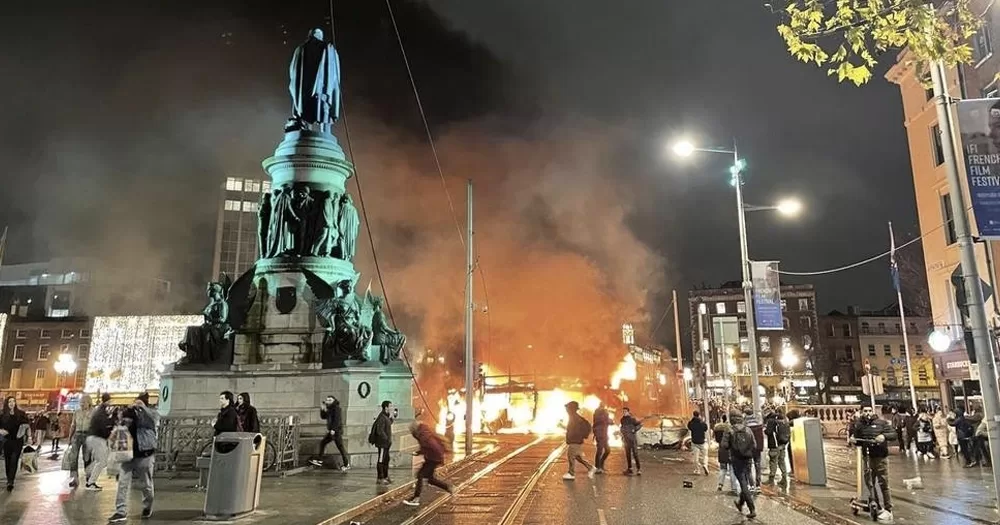Speaking to the Dublin City Policing Committee, Garda Commissioner Drew Harris said that more people are expected to be arrested in connection with the far-right riots that erupted in the Irish capital last Thursday, November 23.
The riots broke out after a brutal knife attack that took place at a school at Parnell Square, where three children and an adult were injured. A five-year-old girl remains in critical condition in hospital, while a six-year-old and a different five-year-old have been discharged following treatment.
The perpetrator of the attack was also seriously injured. He was stopped at the scene by passersby, including Brazilian delivery driver Caio Benicio and 17-year-old French trainee chef Alan Loren-Guillemot. Filipino nurse Leo Ralph Publico Villamayor also provided first aid to one of the children.
Following the attack, unconfirmed reports that the perpetrator was an immigrant led far-right agitators to whip up a frenzy on social media, urging people to protest. This led to the widespread violence that broke out in Dublin, resulting in 48 arrests to date.
Crowds began to gather in the city centre and violence escalated, with rioters attacking police officers, setting cars and public transport on fire, and smashing and looting shops. Many were chanting anti-immigration slogans while carrying out the destruction.
Describing the far-right riots in Dublin, Garda Commissioner Harris said: “It was one of the worst situations I’ve seen. We did go door to door that night to make sure people were not trapped in shops. It was an organisational mobilisation in short order, a whole of organisation response.”
He told the policing committee that an investigation is underway on the role of far-right online instigators in the Dublin riots. He added that more arrests would be made when more digital evidence becomes available, but that in the meantime these individuals remain at large and represent a risk of disorder and hate crime.
Gardaí are examining social media posts from several accounts to determine whether there was incitement to violence. Among the examined posts are also statements made by mixed martial arts fighter Conor McGregor, who took to social media to comment on the knife attack and following unrest.
Harris said that social media were monitored during last week’s chaos, adding that very serious disinformation was published during an eight-hour period. He explained how certain companies were quick at taking misleading and harmful content down, but it was a “constant battle”. He added that “so much violence and suffering is available on social media” that it is “contributing to people’s perception”.
According to a study published last week, far-right groups and individuals play a major role in spreading disinformation in Ireland. Many employ threatening rhetoric in discussions about “the arrival to Ireland of tens of thousands of refugees and asylum seekers from 2022 onwards, and teaching children about LGBTQ+ issues.”
As the report explains, such online agitators often also urge their followers to mobilise “against immigration by framing asylum seekers or refugees as an existential threat to Ireland and spreading hateful falsehoods about the LGBTQ+ community”.
During the meeting with the policing committee, Sinn Féin Councillor Daithí Doolan told the Garda Commissioner that the far-right has been sowing the seeds of conflict and fear in the community for years. He also criticised the Gardaí’s lack of appropriate response to the far-right and their actions, adding that the only people who are not in fear of this movement are white men, while minorities in Ireland are afraid.
Activists from minority groups have been warning about the dangers posed by the far-right for years, calling for an appropriate response to the issue from authorities. However, politicians and certain parts of mainstream media have continued to portray the far-right as a harmless group of conspiracy theorists rather than a political movement with international links.
In Ireland in particular, the Covid pandemic was a catalyst for far-right growth, with anti-lockdown groups gaining traction on social media and drawing together anti-vaxxers and conspiracy theorists. The government’s failure to deal with prominent social problems then represented another opportunity for the far-right to expand.
Over the past year, far-right agitators have instigated protests outside of refugee accommodations as well as public libraries across the country, with demonstrators demanding the removal of LGBTQ+ reading material. These episodes were mostly policed passively by Gardaí and there hasn’t been a proper targeted response to the movement.
© 2023 GCN (Gay Community News). All rights reserved.
Support GCN
GCN is a free, vital resource for Ireland’s LGBTQ+ community since 1988.
GCN is a trading name of National LGBT Federation CLG, a registered charity - Charity Number: 20034580.
GCN relies on the generous support of the community and allies to sustain the crucial work that we do. Producing GCN is costly, and, in an industry which has been hugely impacted by rising costs, we need your support to help sustain and grow this vital resource.
Supporting GCN for as little as €1.99 per month will help us continue our work as Ireland’s free, independent LGBTQ+ media.
